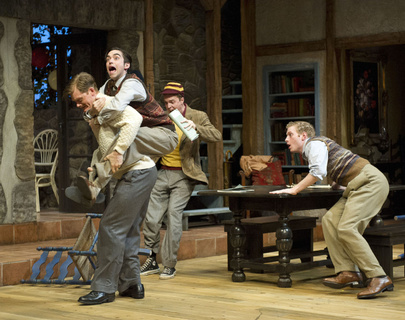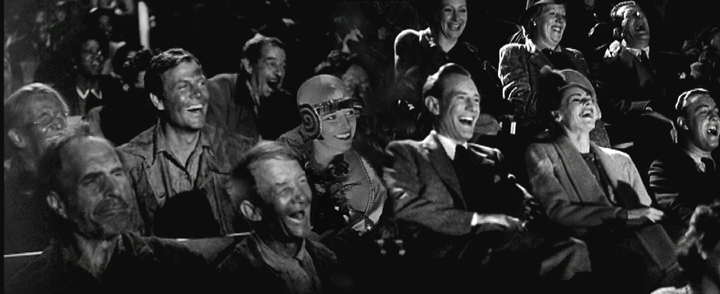“Sid Caesar once gave me the best advice about cutting: ‘If they don’t hear it, they never know you wrote it.'”
Neil Simon, Rewrites
Archives for 2012
WHY COMEDY IS TRUER TO LIFE THAN TRAGEDY
“In most human lives, absurdity and sorrow are woven together too tightly to be teased apart–and it is comedy, not tragedy, that illustrates that fact most fully. Life is too complex to be painted solely in shades of black…”
TT: Boys will be boys
In today’s Wall Street Journal I file the first of two reports from Canada’s Shaw Festival. This one is about a rare revival of Terence Rattigan’s French Without Tears. Here’s an excerpt.
* * *
Terence Rattigan is best known–entirely known, if truth be told–for his understated yet emotionally fraught dramas of middle-class inhibition. Most playgoers have forgotten (assuming that they ever knew it) that he first made his name in England with “French Without Tears,” a meringue-light romantic comedy whose 1936 West End premiere came off so spectacularly that the show, whose cast included the not-yet-famous Rex Harrison, Trevor Howard and Jessica Tandy, ran for 1,039 performances. It’s as though Arthur Miller had launched his career not with “All My Sons” but a six-door farce.
While “French Without Tears” continues to be revived in England, it has yet to make an impression on this side of the Atlantic. The 1937 Broadway transfer got decent reviews but closed after an undistinguished three-month run, and the subsequent film version (which starred Ray Milland) is known only to historians of British cinema. So far as I know, “French Without Tears” hasn’t been produced by any professional theater company in America since its original Broadway run.
 That’s why I went up to Canada’s Shaw Festival to see that company’s ultra-rare revival. Could the author of “The Deep Blue Sea” and “Separate Tables” really have known how to split the sides of a matinée crowd? The answer–as one of Mr. Rattigan’s more decorous characters might have put it–is decidedly in the affirmative. Not only is “French Without Tears” as funny as anything by Noël Coward or Alan Ayckbourn, but Kate Lynch’s staging is as good as it could possibly be….
That’s why I went up to Canada’s Shaw Festival to see that company’s ultra-rare revival. Could the author of “The Deep Blue Sea” and “Separate Tables” really have known how to split the sides of a matinée crowd? The answer–as one of Mr. Rattigan’s more decorous characters might have put it–is decidedly in the affirmative. Not only is “French Without Tears” as funny as anything by Noël Coward or Alan Ayckbourn, but Kate Lynch’s staging is as good as it could possibly be….
Part of what makes “French Without Tears” so interesting is that for all the play’s fetching frivolity, Mr. Rattigan’s characters are neither as simple nor carefree as they look. His “sophisticated” young gentlemen in particular are sexually naïve almost-boys who are all too obviously afraid of women. Even the Hon. Alan Howard (pitch-perfectly played by Ben Sanders), who purports to be the very model of a suave intellectual, is defenseless in the face of a full-court press by the scheming Diana. Moreover, they–and we–are well aware that Europe is on the verge of turning itself upside down, and our consciousness of the coming collapse of the old order that spawned Mr. Rattigan’s characters lends a sharp tang of melancholy to their lunatic cavorting….
* * *
Read the whole thing here.
TT: It could happen to you
In today’s Wall Street Journal “Sightings” column I expand on a notion that’s been much on my mind in recent years, my growing belief that comedy is truer to life than tragedy. Here’s an excerpt.
* * *
Of all the great tragedies, Shakespeare’s “King Lear” seems to me to be the very greatest. I went to a very fine production of “Lear” the other day, and was impressed all over again by the play’s incomparable richness and beauty. Yet all things being equal, I’d almost always choose to see a comedy like “Twelfth Night” or “Much Ado About Nothing” instead. It’s not that I don’t love “Lear.” I do, passionately. But as I grow older, I grow more firmly convinced that comedy is truer to life than tragedy, not just onstage but in all the narrative art forms.
 This isn’t to say that the tragic vision of life is false. I’ve sat through more than enough funerals to have figured that out….But I’ve spent enough time chuckling at the unintended absurdities of those very same funerals to know that in most human lives, absurdity and sorrow are woven together too tightly to be teased apart–and it is comedy, not tragedy, which illustrates that fact most fully. Life is too complex to be painted solely in shades of black. Even Shakespeare made room in “Lear” for the Fool, who makes us all laugh by saying out loud what poor old King Lear fears in his heart of hearts–that he, too, has been a fool, and will shortly pay the ultimate price for his foolishness….
This isn’t to say that the tragic vision of life is false. I’ve sat through more than enough funerals to have figured that out….But I’ve spent enough time chuckling at the unintended absurdities of those very same funerals to know that in most human lives, absurdity and sorrow are woven together too tightly to be teased apart–and it is comedy, not tragedy, which illustrates that fact most fully. Life is too complex to be painted solely in shades of black. Even Shakespeare made room in “Lear” for the Fool, who makes us all laugh by saying out loud what poor old King Lear fears in his heart of hearts–that he, too, has been a fool, and will shortly pay the ultimate price for his foolishness….
Yes, “King Lear” is charged with universal feelings–but it isn’t real. Not only is it set in a far-off fairyland of kings and queens, but it ends, like most of Shakespeare’s tragedies, with a mile-high stack of corpses, a horrific spectacle which precious few of us have had the misfortune to behold.
Because Shakespeare was a genius, he was capable of making us sympathize with Lear and his regal travails. If, on the other hand, the hapless hero of a comedy should trip over a rake, fracture his pelvis and bring the house down, we don’t have any trouble identifying with his preposterous plight. We’ve all been there, more or less….
* * *
Read the whole thing here.
An excerpt from the 1983 TV version of King Lear, starring Laurence Olivier as Lear, John Hurt as the Fool, and Diana Rigg as Regan:
TT: Almanac
“Shaksbeer is passimist because is de life passimist also!”
Leo Rosten, The Education of H*Y*M*A*N K*A*P*L*A*N
TT: So you want to see a show?
Here’s my list of recommended Broadway, off-Broadway, and out-of-town shows, updated weekly. In all cases, I gave these shows favorable reviews (if sometimes qualifiedly so) in The Wall Street Journal when they opened. For more information, click on the title.
BROADWAY:
• Bring It On (musical, G, closes Jan. 20, reviewed here)
• Evita (musical, PG-13, reviewed here)
• Once (musical, G/PG-13, all performances sold out last week, reviewed here)
OFF BROADWAY:
• Avenue Q (musical, R, adult subject matter and one show-stopping scene of puppet-on-puppet sex, reviewed here)
• The Fantasticks (musical, G, suitable for children capable of enjoying a love story, reviewed here)
• Tribes (drama, PG-13, closes Jan. 6, reviewed here)
IN EAST HADDAM, CONN.:
• Carousel (musical, G, closes Sept. 29, reviewed here)
CLOSING NEXT WEEK ON BROADWAY:
• The Best Man (drama, PG-13, closes Sept. 9, reviewed here)
CLOSING SUNDAY IN CHICAGO:
• Freud’s Last Session (drama, PG-13, restaging of off-Broadway production, reviewed here)
CLOSING SUNDAY IN MINNEAPOLIS:
• The Sunshine Boys (comedy, G, reviewed here)
TT: Almanac
“The imagination loses vitality as it ceases to adhere to what is real.”
Wallace Stevens, “Imagination as Value”
TT: Guess who came to the show last night?
It seems that the governor of Massachusetts read the review of Satchmo at the Waldorf in Tuesday’s Boston Globe–and called the box office:

